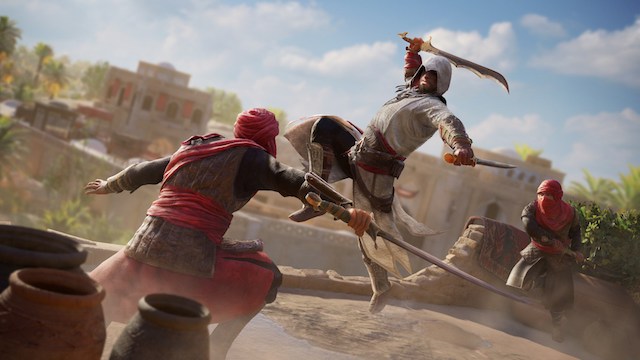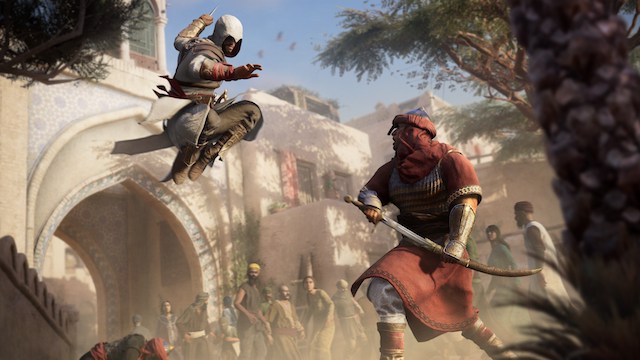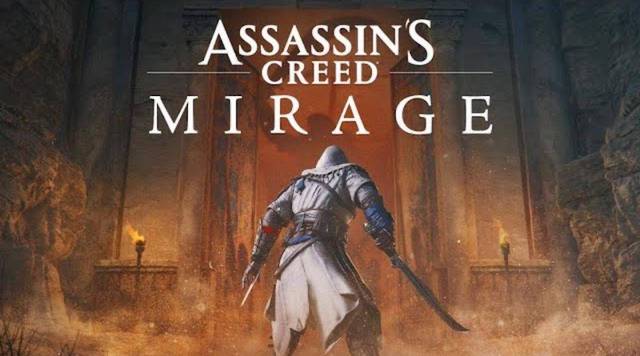What once began as a stealth action series transformed into an action-RPG in recent years, following a short jaunt into side-scrolling stealth. I’m talking about Assassin’s Creed — Ubisoft’s flagship franchise, which started under Jade Raymond’s command all the way back prior to 2007. Since then, it’s been sixteen years of historically killing Templars/the Order, while being inside of the Animus. What was once a new IP and a hope has spawned many games and spin-offs, and is still going strong.
After taking a three year hiatus following the release of its biggest and longest game yet, Ubisoft’s favourite son has returned for this holiday season, in the form of Assassin’s Creed: Mirage. However, instead of following in its recent predecessors’ footsteps, this one takes things back to the beginning and goes back to basics, with some added/borrowed elements from recent titles thrown into the mix.
Assassin’s Creed: Mirage is the story of Basim; a street thief residing in Baghdad’s slums. Following a risky heist, he finds himself a very wanted man, and ends up fleeing for safety reasons. It’s then that he becomes (even more) entangled with the Hidden Ones, who recruit him and take him under their wing. What comes afterwards is a training montage, and some necessary practice.

After becoming a full fledged Hidden One, Basim starts from the beginning and is tasked with exploring Baghdad and investigating the masked Order, who appeared in other recent games. Those masked jerks are up to no good once again, and it’s up to us to discover their identities before putting them six feet under. This differs mechanically from what we’re used to, because it’s much more focused and takes place in a much more streamlined game. One that features investigations and clues instead of quests, or at least calls them that instead.
Think of a flat background, then add several circles to it. Around those circles you’ll want to add some more, smaller ones. That’s basically what the investigation page of the menu screen looks like. You must first complete the smaller investigations before they reveal the bigger circle (the identity of the bad guy you’re going to have to kill) in the middle. It’s pretty straightforward.
Mirage‘s version of Baghdad features four different bureaus, all of which are found in different parts of the city. Each one has its own questline, or investigation(s), to complete. Then, once those are finished, they all lead to the middle where the big bad’s circle lays. You’re essentially completing all of those smaller investigations and mid-level assassinations in order to discover who the big one is, and unlock it.

As mentioned previously, this is a much more ‘back to basics’ interpretation of Assassin’s Creed, meaning it has more in common with the original game than it does the more recent RPGs, which I thought were pretty great. As such, you’re locked into a smaller open world, are not completing lots of different quests (although there are some side quests, which task you with aiding random people or protecting them from bad guys), and must really focus on discovering and dispatching your targets.
When it comes to an actual, important, assassination, things slow down and become incredibly focused. All that matters is that assassination, and there are different ways of going about each one. For instance, will you sneak in through a broken fence, or will you use the safety and assistance that comes with blending into a crowd of merchants. Perhaps you’ll even hire some sword swinging badasses to jump in if you’re spotted and subsequently attacked. There’s room for experimentation, along with secret entrances and the like. Finding your own way is a big part of this game, and so is searching for guards carrying keys to locked doors, be they someone you decide to pickpocket or kill.
Basim does have a bird friend, though, so aerial surveillance and enemy tagging is a go. You can use the eagle any time there isn’t a sharpshooter around, but not when you’re inside a building, for obvious reasons.
Whenever you are spotted, either by walking past guards, entering a tough to discern restricted area, attacking someone or the like, you’ll need to think on your toes. There are ways to escape, either by running away or using one of the hiding spots (like piles of hay or changing booths), but it’s not always easy. Enemies will follow for quite a while. Your best bet is to run around town and look for wanted posters, which can reduce your wanted level when ripped. They’ll appear on your directional toolbar, which is also helpful whenever a quest tells you to go somewhere north, east, south or west.

In the same vein, Assassin’s Creed: Mirage requires that you actually heal yourself instead of waiting for health to replenish. To that extent, it’s important to keep an eye out for berry bushes or pots of food, which will heal you somewhat and perhaps even fully. The thing is, though, that they’re pretty limited and you’ll rarely come across them, which I see as a design flaw. Thankfully, Basim can carry up to three health vials, which fully replenish his health. Things would be pretty annoying and frustrating otherwise.
Now, you’re probably wondering about the combat and how it is. Let’s get to that now.
As with the RPGs (Origins, Odyssey and Valhalla), you’ll be using the right shoulder button to attack. Be warned, though, because Basim only has a certain amount of stamina and the meter can take a bit of time to replenish, leaving you vulnerable and unable to attack. I’m not a big fan of stamina meters, and honestly find it kind of annoying. It also took me quite a bit of time to get used to the combat here, which involves watching to see if enemies turn yellow (light attack) or red (heavy attack) before either parrying or dodging. The timing isn’t perfect, and if you’re mid-swing you’ll likely get hit. The same is true if you don’t seem to press the right button (LB for parry, and I believe X for rolling away) in time. I know that I got hit lots of times I’d expected to parry or move away.
Basim carries tools, as well, and these include noisemakers, smoke bombs, throwing knives and more. Using these to your advantage can be the key to victory, as opposed to death, but they’re not unlimited. You’ll find that you can carry more of them, though, if you unlock the corresponding skill using earned experience points. There are three different skill trees, which have to do with different things. For instance, one deals completely and only with the eagle.

As far as the story goes, things are pretty good but not great. Basim is an interesting and morally conflicted character, but he’s definitely not the most memorable or enjoyable Assassin’s Creed protagonist to portray. The same is honestly true of his story, which is decent. I never felt truly hooked by the game, or its narrative, even though this is a shorter, 12-15 hour experience than its massive, most recent, predecessors. Then again, there’s definitely still some series fatigue to attribute part of that to. I’ve played all of the Assassin’s Creed games, and beat most of them.
Visually, Assassin’s Creed: Mirage is the best of the bunch. Despite all of the sandy brown architecture, and the sandy ground, it can be quite colourful at times. It also looks really nice, in terms of fidelity. The only downside I noticed was a glitch that made some NPCs’ clothes fly up as if they were wearing massive capes. The bottom flaps would fly up and go haywire. This is something I saw a number of times as I played through the game before launch.
As far as other glitches are concerned, I should mention that I experienced two. First, the game crashed on me during the second last mission. Then, it failed to load a cutscene before the final one. Hopefully these things will be patched soon.
The audio is also as you’d expect for an Assassin’s Creed game. It’s immersive, and there’s lots of dialogue. Everything sounds good and as it should, with fitting and quality sound effects to boot. Nothing stood out negatively here at any point.
With Assassin’s Creed: Mirage, Ubisoft has taken the series back to the beginning. This will be appreciated by those who didn’t like the last three open world RPGs, but I can’t say it made me excited. I was hoping I would end up enjoy this one, and tempered my expectations. In the end, I did like it and had some fun, but was also a little bit bored at times. Assassin’s Creed is best when it’s more varied, and I honestly prefer the RPG games to this. Furthermore, while Basim’s story is good, and the gameplay is solid, it’s far from my favourite game in the series. There’s nothing wrong with it, but it just didn’t hook me like the others, and is only decent overall.
This review is based on the Xbox Series X version of the game, which we were provided with.

